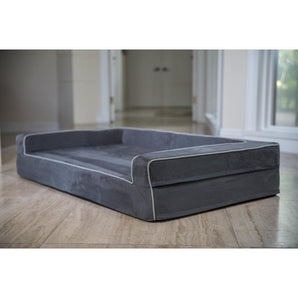Service dogs provide crucial assistance to those who need help navigating daily life. But with so many dog breeds out there, how do you know which ones make the best service animals?
We've done the research, and these breeds come in as the best service dog breeds:
- Labrador Retriever
- Golden Retriever
- German Shepherd
- Poodle
- Border Collie
- Boxers
- Great Dane
- Australian Shepherd
- Bernese Mountain Dog
- Doberman Pinscher
What are Service Dogs?

Service dogs are specially trained to perform tasks that help people with disabilities or specific medical needs. They can provide assistance in a variety of ways, from retrieving objects to alerting their owners to medical emergencies. Some service dogs help guide individuals with visual impairments, while others support those with mobility challenges by providing physical stability. Their training is tailored to the specific needs of their handler, making them valuable partners in daily life.
Are Emotional Support Animals the Same as Service Dogs?

It’s a common question: are emotional support dogs the same as service dogs? The short answer is no. While emotional support dogs (also sometimes called therapy dogs) offer comfort and companionship to their owners, they don’t receive the same specialized training as service dogs. Emotional support dogs also don’t have the same public access rights as service dogs, who are allowed in most public places because they’re performing essential tasks for their owners.
Types of Service Dogs
There are several types of service dogs, each trained to help with specific needs.
- Mobility Assistance Dogs: These dogs are trained to help people with physical disabilities. Whether it’s retrieving dropped items, opening doors, or helping someone stay balanced, they make mobility easier.
- Hearing Dogs: Hearing dogs alert their owners to important sounds like doorbells, alarms, or even a baby crying.
- Psychiatric Service Dogs: For those struggling with conditions like PTSD, anxiety, or depression, a psychiatric service dog can offer support through trained tasks like interrupting harmful behavior or providing deep pressure therapy.
- Guide Dogs: Guide dogs assist individuals who are blind or have low vision by helping them navigate their environment safely.
- Medical Alert Dogs: These dogs can sense medical issues before they happen, such as low blood sugar or impending seizures. They alert their owner to take action, making them life-saving companions.
What Breeds Make Good Service Dogs?

While the American Disabilities Act (ADA) doesn't specify any specific breed requirements for service dogs, not all dogs have what it takes to become working dogs. There are some breeds that make great service dogs. They're usually purebred rather than mixed breeds, and are usually some of the smartest dog breeds that can be highly trained in specific areas.
1. Labrador Retrievers
Labrador Retrievers are one of the most popular service dog breeds, and it’s easy to see why. Labs are known for their intelligence, patience, and eager-to-please nature, making them ideal for various service dog tasks.
Whether it’s helping with mobility assistance by retrieving items or guiding individuals with visual impairments, labs can handle it all. They also make great diabetic alert dogs and seizure alert dogs because they are capable of sensing changes in their owner’s body chemistry to alert them of impending medical events like seizures or low blood sugar.
2. Golden Retrievers
Golden Retrievers make excellent service dogs due to their intelligence, friendly nature, and adaptability. Their calm and patient demeanor makes them ideal for tasks like guiding individuals with visual impairments and providing mobility assistance.
Golden Retrievers are highly trainable and can master complex commands, making them reliable for medical alert tasks such as detecting changes in blood sugar or sensing seizures. You'll often see them serving as diabetic alert dogs or seizure alert dogs.
3. German Shepherds
German Shepherds are known for their loyalty, discipline, and work ethic. They’re one of the most versatile service dog breeds, excelling in roles that require focus and quick decision-making. Shepherds are frequently used as guide dogs, mobility assistance dogs, and medical alert dogs.
Their strong intelligence allows them to learn commands quickly, while their protective nature makes them devoted to their owners. German Shepherds do well in environments that demand a high level of alertness, making them perfect for individuals with medical needs that require constant monitoring.
4. Poodles
Poodles might be best known for their curly coats and hypoallergenic qualities, but they’re also incredibly intelligent and trainable. This makes them a fantastic option for those with pet allergies who still need a service dog.
Poodles are often used as hearing dogs, trained to alert their owners to important sounds like alarms, doorbells, or even the phone ringing. They’re also skilled at medical alert tasks, such as detecting changes in blood sugar levels.
5. Border Collies
Border Collies are high-energy dogs that are also incredibly intelligent, making them a great choice for service dog tasks that require quick thinking and problem-solving. Their eagerness to work makes them ideal for medical alert tasks, where they can keep up with fast-paced environments and stay alert to changes in their owner’s condition.
Border Collies are natural working dogs that thrive when they have a job to do, so they’re great for service dog work that requires both mental and physical stimulation. Their natural herding instincts also make them great at helping guide or direct their owners in crowded or complex spaces.
6. Boxers
These strong yet gentle dogs are often seen working as psychiatric service dogs. Their solid build allows them to perform deep pressure therapy, which is a calming technique often used to ground individuals experiencing anxiety or panic attacks.
Boxers are also incredibly loyal and affectionate, providing emotional support while being strong enough to assist with physical tasks if needed. Their playful and loving personality helps to lighten the mood, making them wonderful companions for those who need both emotional support and occasional assistance with daily activities.
7. Great Danes
Great Danes are the gentle giants of the dog world. They may be famous for their enormous size, but they’re also known for their calm demeanor. Because of this, they make excellent mobility assistance dogs, using their strength to help individuals with physical disabilities move around more easily.
Despite their size, Great Danes are incredibly patient and easygoing, which makes them perfect for service work in environments where calm behavior is a must. Their ability to assist with balance and mobility tasks, combined with their sweet-natured personalities, makes them a great choice for people who need physical support from their service dog.
8. Australian Shepherds
Australian Shepherds are highly intelligent, energetic, and highly trainable, which makes them ideal for service dog roles that require quick thinking and agility. They excel at tasks like medical alert and psychiatric assistance, where their sharp instincts and ability to quickly react to changes in their owner’s condition come in handy.
Aussies have a natural herding instinct, which can be useful for keeping their owners safe in crowded spaces or guiding them to safer areas. With their high energy levels, Australian Shepherds thrive in active homes where they can stay physically and mentally engaged.
9. Bernese Mountain Dogs
Bernese Mountain Dogs are known for their strength, loyalty, and calm demeanor, which makes them one of the best service dog breeds for mobility assistance. These large, sturdy dogs are capable of helping individuals with physical disabilities by providing balance support or pulling wheelchairs.
They make good companions for individuals who need both physical assistance and emotional comfort. Their easygoing nature also makes them great for service work in a variety of environments, from busy public spaces to quieter home settings.
10. Doberman Pinschers
Dobermans are highly intelligent, loyal, and protective, which makes them an excellent choice for service dog roles like medical alert and mobility assistance. Their strong sense of awareness allows them to detect changes in their owner’s physical condition, making them ideal for medical alert tasks.
Dobermans are also very strong dogs, which means they can assist with physical tasks while staying alert and focused. Their loyalty and natural protective instincts ensure that they stay committed to their owner’s well-being, making them a dependable partner in any situation.
Service Dog Training Requirements
Service dogs undergo rigorous training to ensure they can reliably perform essential tasks in various environments. Although the ADA doesn't have specific training requirements, and individuals can opt to train their own dogs if they wish. However, professional service dog training organizations can train dogs to perform highly specific skills such as detecting an impending seizure.
Caring For Your Service Dog
Here’s are some tips to make sure your service dog stays happy and healthy.
- Balanced Diet: A nutritious diet is key for keeping your service dog healthy. Choose high-quality food tailored to their size and energy level.
- Home Life: Your service dog deserves a safe and loving home environment. Make sure they have a designated space where they can relax when they’re off-duty. And don’t forget to provide regular grooming, especially for breeds that have thick coats that can get matted without care.
- Proper Sleeping Arrangements: Just like you need a good night’s sleep to perform your best, so does your service dog. Provide them with a comfortable bed to ensure they get the rest they need after a hard day’s work.
- Toys and Playtime: Service dogs need downtime from their work, too! Be sure to give your dog plenty of opportunities to play.
If you think you may benefit from having a service dog, start by talking with your healthcare provider or a professional service dog trainer. They can help you determine the best service dog breeds for your needs so you can begin the process of training and certification.





